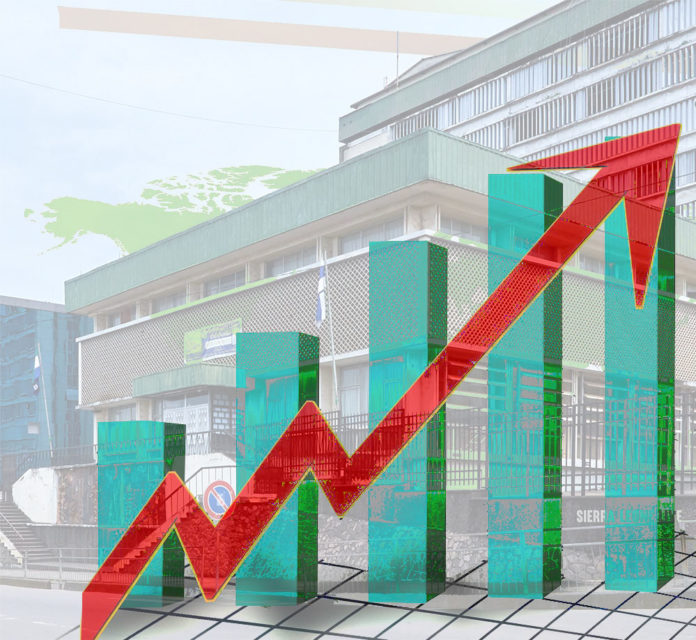A few months back, the Consumer Price Index (CPI) in Sierra Leone increased to 366.30 in December from 358.70 in November; source: Statistics Sierra Leone. Inflation of 13.3% for the Sierra Leone economy indicated some despair for households amidst the pandemic and the current Russian NATO proxy war taking place in Ukraine. This inflation figure means that in comparison to January last year, prices have gone up by 13 per cent for the basket of goods that a consumer typically purchases. This seems an unreasonable number to expect and is a bad scenario for the consumers.
For a government with an increasing level of public debt and a large fiscal deficit, this could explain the need to hike prices of petrol, diesel, and liquefied petroleum gas (LPG), especially in the midst of a pandemic and the ongoing proxy war between Russia and NATO taking place in Ukraine. Let me explain how a large fiscal deficit gives incentives for the government to increase taxes on essential commodities.
This is a concept called inflation tax. With the inflation tax, the government could increase prices either by increasing taxes on essential commodities or asking the Bank of Sierra Leone to print more money. The result of increasing such taxes is that they get passed on to consumers as a general increase in prices. The most obvious contender for such a general increase in taxes is universal inputs used by most consumers in a country.
A key universal input in the production process includes fuel. An increase in the prices would largely increase transportation costs and directly affect our day-to-day expenses. There is more! Fuel acts as a universal input for production too. Farm products are moved from our villages to Freetown and other main cities and this transportation rely on fuel. A hike in fuel price affects the agricultural sector as farmers and distributors have lesser profit, so they pass it on to consumers.
Let us take a simple example. Think of Le 250,000 which is in your wallet. When inflation is less, you could potentially buy 50kg age of rice with that amount. But when the government increases taxes on fuel or on basic food items, the same Le 250,000 fetches you only 25kg bag of rice at higher prices. Now imagine this happening across the board for all the commodities. This is general inflation. So, why does the government tax food and fuel to increase inflation? The government does this to erode the real value of government debt.
Continuing with the example of rice purchase, let us suppose that we borrow Le125,000 from our neighbour to buy a 25kg bag of rice before the inflation episode took place. We could purchase 25kg of a bag of rice. In the interim, the government increased the fuel price because of which the general level of prices increased. When we repay our neighbour, he could not buy a 25kg bag of rice for the same amount of money. What happened in the interim is that prices of all goods increased. This benefited you the borrower and worked against your neighbour, the lender.
Now, if we apply this concept to the entire economy, the increase in fuel prices is indicative of a strategy by the government whereby it is pressured by a need to payout its debt. In other words, now the government is the borrower who gains from inflation in the economy. This could partly explain the constant increase in fuel prices despite the proxy Russia NATO war taking place in Ukraine and the increase in crude oil prices. Moreover, this strategy is also adopted by States around the globe that have the power to levy Value Added Tax (VAT) on fuel.
Even though inflation tax is an indirect strategy for sustaining fiscal deficit, it is often adopted by policymakers all over the world. The more direct way to pay for the borrowings is to earn money. However, given the projections, the likelihood of an increase in Gross Domestic Product (GDP), so that the government could generate enough revenue, remains bleak. In such circumstances, a more indirect approach is mandated and that is what we are witnessing.
The existing deceptive comment by certain individuals of the previous government and their supporters is that they were providing sizable fuel subsidies and hence, lessen greater taxes on fuel to make life comfortable for consumers. This was never the truth. In fact how big was ‘sizable’ is certainly an opinion, but if we compare their statement and try to use the right economics word to justify their past actions with respect to this subject, they were actually doing tax cut on fuel, but never they’ve subsidised for fuel.
Thus, the tax cuts were paltry in comparison with the tax revenues. So, a part of the tax cut was necessary then and needed further increased to counteract the possible increase in fuel prices.
Signs of poor management
The continuous increase in fuel prices over the last few years under the Bio led administration points to systematic mismanagement of public debt. This is how our taxes are paying for the government’s extravagance. This is the sort of economics that masks administrative inefficiency.




